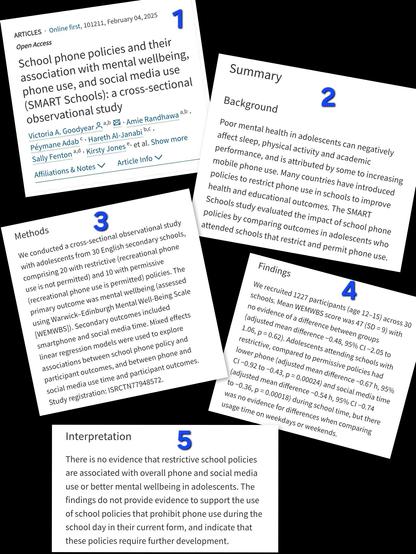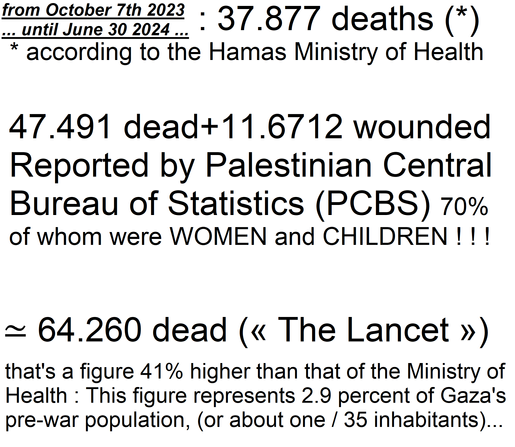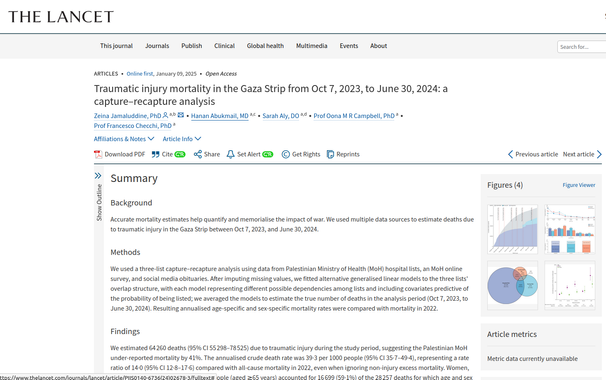Gênero e saúde global: estudo da Lancet analisa avanços e desafios do Brasil na busca por equidade
- cijnusp
https://jornal.usp.br/radio-usp/genero-e-saude-global-estudo-da-lancet-analisa-avancos-e-desafios-do-brasil-na-busca-por-equidade/
#Atualidades #JornaldaUSPnoAr #JornaldaUSPnoAr1edio #RdioUSP #Debatedegnero #Desigualdadedegnero #FaculdadedeSadePblica #Lancet #SUS
#Lancet
"Unless those journals change dramatically, we are going to stop NIH scientists from publishing in them and we’re going to create our own journals in-house."
-- RFK Jr.
Troubling to ask: is the worm truly dead?
With such a cluttered target environment the below obscurely located little radar screen has the best non-paywalled rundown.
UK lawyer make questionable remarks about Gaza
The charity UK Lawyers for Israel claim the Gaza conflict might ‘help solve obesity‘
May 2025
UPDATE: 20 May. At the Coop agm, 73% of members did vote to ban Israeli products on its shelves. The Board will now consider this decision.
Few may have heard of this charity which has a prestigious list of members and patrons. It is in the news recently (10 May) because its chief executive made some highly questionable and some might argue ill-judged remarks about the effect on the conflict in Gaza on its citizens. He was referring to a letter published on July 20th 2024 in the Lancet in which the estimate of those killed in the conflict might reach 186,000. The death toll at the time was around 37,000.
The Coop was to debate a motion from its members [No 13] to stop trading with Israel in view of the death toll in Gaza. The motion quotes the Lancet estimate. The UKLFI chief executive Jonathan Turner objected to the Coop motion saying:
“We first pointed out that the letter published in the Lancet on 20 July 2024, to which the motion evidently referred, did not claim that 186,000 Gazans had died in the current war. It did, however, claim – without foundation – that 186,000 Gaza would be likely to die eventually as a result of the war.
“So we pointed out, secondly, that this claim was based on entirely unfounded speculation, which also ignored factors that might result in lengthening the lives of Gazans, given the public health situation existing in Gaza prior to the war, including the extent of obesity. These factors include the possible reduction in the availability of confectionery and cigarettes”.
“In the context in which they were made, our statements were accurate and objective.” (our italics).
The full text can be read here. This might be seen in hindsight as a somewhat warped view of the conflict and on reflection, an apology issued to withdraw them. However, the Guardian article is referenced on their website without any sign of such an apology or retraction [accessed 11 May at 07:00].
The charity’s objectives are – [The] UKLFI Charitable Trust was set up by UK Lawyers for Israel (UKLFI Ltd), which is is an association of lawyers who support Israel and seek to ensure that the rights of Israel and Israelis are respected.
The charity has a range of reports which seek to counter the narratives which appears in the media. These reports have the appearance of research reports with copious references and footnotes. However, on closer inspection the references do not always support the claims made of them. For example, the bombing of hospitals is usually because the IDF claim they are hiding Hamas operations of various kinds. This is the justification for their destruction. Very little evidence is produced by the IDF. In the charity’s report on this there is still no evidence. Indeed one reference is of an article in Haaretz from 2009, some years before the current conflict which says ‘Intelligence officers suspect’ [the Hamas operations]. Other references do not always support the claims made. The report denying a famine in Gaza was produced in 2024 before the current blockade. Among the conclusions to one report is the plea for ‘more transparency’. This is difficult since foreign journalists are not allowed into the area and the high death toll of those who are – 178 journalist and media workers have been killed in the current hostilities.
UKLFI has a list of patrons of some note. They include Lord Dyson; Lady Cosgrove; Baroness Deech; Stephen Hocken KC; Lord Pannick; Lord Grabiner KC and Lord Howard (formerly the MP Michael Howard). Many are well connected in the British establishment.
One has to question the wisdom of an organisation replete with KCs, other notables and members of the House of Lords, making a claim of this kind. Together with the reports on its site, the purpose seems to be to deny, deny and deny despite the mounting evidence of death and destruction wrought by the IDF. They have threatened the government with legal action over its decision to withhold a limited number of arms licences [not ‘all arms licences’ as the Foreign Secretary, David Lammy twice falsely claimed in a BBC interview last week].
Over 52,000 have now died in Gaza.
Sources: Campaign to Protect Journalists, UKLFI; Guardian; Wikipedia
American readers: a KC is a King’s Counsel which is a barrister of at least 10 years standing who is appointed by the monarch as someone ‘learned in the law’.
This week’s editorial of The Lancet (!):
> “Science and medicine in the USA are being violently dismembered while the world watches. While the risks to civil servants and academics’ livelihoods are real and understandably frightening, bullies are only emboldened by acquiescence or indifference.”
https://www.thelancet.com/journals/lancet/article/PIIS0140-6736(25)00814-1/fulltext
Lancet Letter Exchange on Claimed Success of “Persistent Physical Symptoms” Trial Despite Clinically Insignificant Findings
By David Tuller, DrPH
Last year, The Lancet published a paper from Christopher Burton and colleagues called “Effectiveness of a symptom-clinic intervention delivered by general practitioners with an extended role for people with multiple and persistent physical symptoms in England: the Multiple Symptoms Study 3 pragmatic, multicentre, parallel-group, individually randomised controlled trial.” Per the norm for research on psycho-behavioral interventions for conditions that get dumped into the wastebasket category of “persistent physical symptoms,” the trial was unblinded and relied solely on subjective outcomes for its claims of “effectiveness.”
This study design is known for generating an unknown amount of bias. As repeatedly happens in such trials, the reported benefits on the primary outcome–in this case the mean of a health-related quality of life measure called the PHQ-15–were statistically significant but fell below the threshold designated as the minimal clinically important difference (MCID). The MCID is obviously a statistical construct, it is meant to approximate the level at which an improvement has practical or real-world impact on a patient’s experience of whatever it is.
Claiming effectiveness or success based on clinically insignificant findings is one of the strategies often deployed by investigators in Professor Burton’s field. It is disturbing that peer reviewers for major journals allow these claims to go unchallenged. The same can be said for the editorial team.
My friend and colleague Joan Crawford, a counseling psychologist, and I wrote a letter to The Lancet about this issue. It has just been published, along with a response from the investigators. (Thanks to Joan for spearheading this and shepherding it through the always irritating back-and-forth with the publisher.) The rebuttal is non-responsive to the concerns raised. It is always impossible to know to what extent the results in an unblinded trial relying solely on subjective measures are a measure of bias rather than genuine response to the intervention. That’s the point. It is unknowable. So any “positive” results cannot be taken at face value.
Beyond that, the mean results for the primary outcome in this trial fell below the MCID threshold. By definition, the reported change is meaningless from a clinical perspective at a population level. (That doesn’t mean none of the participants experience clinically significant improvements. Of course some proportion of them do.) In their vacuous response, the authors don’t mention their MCID problem. Instead, they suggest we are overlooking the “explanatory power of recent symptom science”–even though that purported “power” produced these embarrassing findings.
I have posted the published exchange below.
**********
Response to treatment in the Multiple Symptoms Study 3 trial
Joan Crawford, David Tuller
Christopher Burton and colleagues1 conducted an unblinded trial of a consultative intervention for 354 people with persistent physical symptoms but no identifiable “organic” cause. Patient Health Questionnaire-15 (PHQ-15) score, which is a brief, subjective, self-administered screen of severity of somatic complaints, was the primary outcome. This kind of trial design can be expected to produce modest positive outcomes, via expectation bias alone.2 No real-life, objective assessment of functioning was conducted.
The intervention involved up to four sessions with a general practitioner, offering patients “rational explanations” for their symptoms in the absence of known, falsifiable causes and helping patients to develop strategies for managing symptoms. Although the “rational explanations” are not described, they presumably did not include “organic” diseases or conditions.
Scores on the PHQ-15 range from 0 to 30. Recruited patients had scores from 10 to 20, indicating moderate severity. At the end of the study, the adjusted between-group difference of –1·82 did not reach the minimal clinically important difference of 2·3.3 The change is well within what would be expected from bias alone. The results therefore confirmed that the intervention was of limited, if any, practical benefit. However, the paper presents the findings as though they had shown the opposite.
Instead of the “rational explanations” promoted by the investigators, more straightforward and honest explanations—for example, we do not know what is causing symptoms—could easily have produced similar results. Patients desire resolution of symptoms and recovery of functions. The trial did not achieve this result. Post-intervention, participants continue to have an impaired quality of life and poor experiences of health care.
DT holds an academic position at the Center for Global Public Health at UC Berkeley, which is largely supported by crowdfunded donations directly to the university, many of them from patients with myalgic encephalomyelitis or chronic fatigue syndrome and related conditions that fall under the heading of persistent physical symptoms. JSC declares no competing interests.
References
1. Burton, C ∙ Mooney, C ∙ Sutton, L ∙ et al. Effectiveness of a symptom-clinic intervention delivered by general practitioners with an extended role for people with multiple and persistent physical symptoms in England: the Multiple Symptoms Study 3 pragmatic, multicentre, parallel-group, individually randomised controlled trial. Lancet. 2024; 403:2619-2629
2. Edwards, J. PACE team response shows a disregard for the principles of science. J Health Psychol. 2017; 22:1155-1158
3. Toussaint, A ∙ Kroenke, K ∙ Baye, F ∙ et al. Comparing the Patient Health Questionnaire-15 and the Somatic Symptom Scale-8 as measures of somatic symptom burden. J Psychosom Res. 2017; 101:44-50
**********
Response to treatment in the Multiple Symptoms Study 3 trial – Authors’ reply
Christopher Burton, Vincent Deary, Cara Mooney, Laura Sutton, Cindy Cooper
We thank Joan S Crawford and David Tuller for their interest in our Article.1 Persistent physical symptoms are heterogeneous and, by definition, do not tend to go away easily. In the absence of perfect knowledge about their pathophysiology, we believe that interventions to help people with multiple persistent physical symptoms should apply the knowledge that we currently have.2
Pragmatic interventions should have pragmatic evaluations (finding out whether something can be useful) rather than explanatory ones (using an effect to prove a mechanistic hypothesis).3 Multiple Symptoms Study 3 was a pragmatic trial of a complex, pragmatic intervention.1
The study evaluated outcomes shortly after treatment, at 6 months and 12 months. Although outcomes at the end of treatment might reflect a feeling of being heard, it is unlikely that this is the mechanism explaining the statistically significant difference between conditions at the 12-month follow-up point. Rather, we should look to the qualitative process evaluation (an expected part of a complex intervention trial4) to understand and interpret the findings.
Although feeling heard was important to patients, making sense of symptoms using current science and being offered a choice of actions based on this understanding were also valued by patients.5
Encouraging health professionals to proclaim “we do not know what is causing symptoms” in response to persistent physical symptoms, as Crawford and Tuller recommend, underestimates the explanatory power of recent symptom science and is likely to perpetuate the frustration and hopelessness of both clinicians and patients, which is all too common in this field.
CB has received publisher royalties and speaker honoraria in relation to persistent physical symptoms. All other authors declare no competing interests.
References
1. Burton, C ∙ Mooney, C ∙ Sutton, L ∙ et al. Effectiveness of a symptom-clinic intervention delivered by general practitioners with an extended role for people with multiple and persistent physical symptoms in England: the Multiple Symptoms Study 3 pragmatic, multicentre, parallel-group, individually randomised controlled trial. Lancet. 2024; 403:2619-2629
2. Löwe, B ∙ Toussaint, A ∙ Rosmalen, JGM ∙ et al. Persistent physical symptoms: definition, genesis, and management. Lancet. 2024; 403:2649-2662
3. Loudon, K ∙ Treweek, S ∙ Sullivan, F ∙ et al. The PRECIS-2 tool: designing trials that are fit for purpose. BMJ. 2015; 350, h2147
4. Skivington, K ∙ Matthews, L ∙ Simpson, SA ∙ et al. A new framework for developing and evaluating complex interventions: update of Medical Research Council guidance. BMJ. 2021; 374, n2061
5. Sanders, T ∙ Fryer, K ∙ Greco, M ∙ et al. Explanation for symptoms and biographical repair in a clinic for persistent physical symptoms. SSM Qual Res Health. 2024; 5, 100438
"A turning point for #global #health: challenge or opportunity?"
https://www.thelancet.com/journals/lancet/article/PIIS0140-6736(25)00453-2/fulltext
A looming global public health crisis that will create "... serious health conditions and dire financial and societal costs for future generations."—
"More than half of all adults and a third of children, teenagers and young adults around the world are predicted to be overweight or obese by 2050."
https://www.bbc.com/news/articles/cy87d2g81yxo v #BBC
#Lancet:" Global, regional, and national prevalence of adult overweight and obesity, 1990–2021, with forecasts to 2050"
https://www.thelancet.com/journals/lancet/article/PIIS0140-6736(25)00355-1/fulltext
#PublicHealth #obesity
Secondo la rivista #Lancet, nei primi 12 mesi del conflitto l’aspettativa di vita a #Gaza è crollata da 75.5 anni ad appena 40.5, la più bassa al mondo (18 anni meno che in Somalia, 14 meno che in Nigeria.)
Affamare un popolo è un crimine di guerra.
#IsraeliCrimes #CeaseFire #FreePalestine
Life expectancy in Gaza lowest...
Russian Lancet Drones Knock Out 200 U.S. M777 Howitzers in Ukraine
#M777 #howitzer #artillery #ZALA #Lancet #LancetE #drone #loiteringmunition #UAV #securityassistance #militaryaid #UkrainianAirForce #SpecialMilitaryOperation #Russia #Ukraine #UkraineConflict #RussiaUkraineWar #UkraineWar #RussianInvasion
Russian Lancet Drones Knock Out 200 U.S. M777 Howitzers in Ukraine
#M777 #howitzer #artillery #ZALA #Lancet #LancetE #drone #loiteringmunition #UAV #securityassistance #militaryaid #UkrainianAirForce #SpecialMilitaryOperation #Russia #Ukraine #UkraineConflict #RussiaUkraineWar #UkraineWar #RussianInvasion
#MedicalEditors, see this in The #Lancet: “#Predatory #journals: what can we do to protect their prey?” https://www.thelancet.com/journals/lancet/article/PIIS0140-6736(24)02863-0/fulltext
New study providing some #evidence that 'obvious' #solutions might not always be the answer.
(I.e., according to this #study, there is no evidence that restrictive #school #policies are associated with overall #phone and social media use or better #mental #wellbeing in #adolescents).
See full #Lancet study here: https://www.thelancet.com/journals/lanepe/article/PIIS2666-7762(25)00003-1/fulltext
#socialmedia #schools #education #research #mentalwellbeing #health #mentalhealth #studies #empiricaldata #empiricalresearch #empiricalstudy #empiricalstudies
Savaş Ömürlerinden Çaldı: Gazze'de Yaşam Beklentisi 40 Yıla Düştü
#Gazze, #YaşamBeklentisi, #İsrail, #Hamas, #Çatışma, #Savaş, #İnsaniKriz, #Lancet, #SağlıkSistemi, #Kadınlar, #Çocuklar, #BirleşmişMilletler, #Eleştiri, #SosyalAdalet, #UluslararasıDestek, #İnsaniYardım, #Barış, #SivilHayat, #KayıpListeleri, #NüfusSayımı, #SavaşınEtkileri, #Afganistan, #Mülteciler, #İnsaniHaklar, #SivilÖlümler, #YerindenEdilme, #Kalkınma, #Duyarlılık, #Eğitim, #YardımÖrgütleri
#GAZA #october7 (2023) / #June30 (2024)
Palestinian civilians #KILLED or #WOUNDED
1) #Hamas #Ministry of #Health
2) #Palestinian #Central #Bureau of #Statistics
3) #TheLancet [ #Lancet ]
Lancet just published a study on "Traumatic injury mortality in the Gaza Strip from Oct 7, 2023, to June 30, 2024"
#lancet #gaza #deaths
https://www.thelancet.com/journals/lancet/article/PIIS0140-6736(24)02678-3/fulltext




